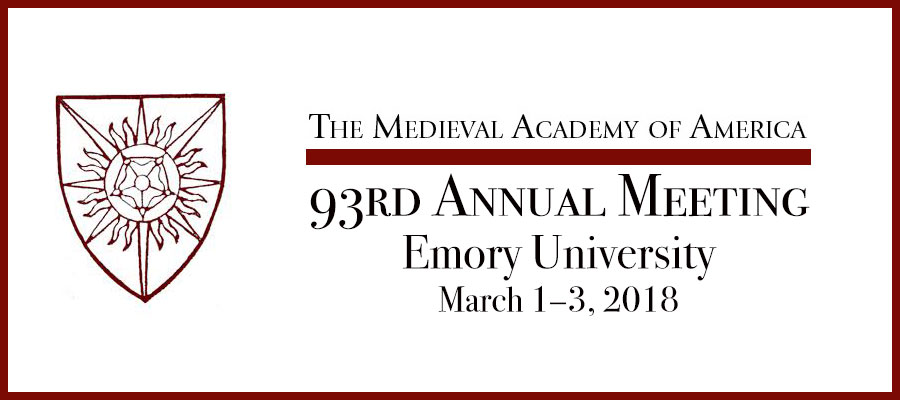93rd Annual Meeting of the Medieval Academy of America, Emory University, March 1–3, 2018
The Program Committee of the Medieval Academy of America invites proposals for papers on all topics and in all disciplines and periods of medieval studies. Any member of the Medieval Academy may submit a paper proposal; others may submit proposals as well but must become members in order to present papers at the meeting. Special consideration will be given to individuals whose field would not normally involve membership in the Medieval Academy.
Please note: the prohibition against presenting a paper more than once every three years is no longer in effect.
The Medieval Academy welcomes innovative sessions that cross traditional disciplinary boundaries or that use various disciplinary approaches to examine an individual topic. To both facilitate and emphasize interdisciplinarity, the Call for Papers is organized in “themes.”
2018 Annual Meeting Themes
- Representing the Mysteries of Faith in Art, Liturgy, and Devotion
- The Religious Orders: Diffusion of Artistic and Religious Practices between Monastery and City
- The Medieval Artes and their Books
- The Long Fourteenth Century
- Transconfessional Spaces in Andalusi Cities
- Umayyad Córdoba and Nasrid Granada: Poetry, Philosophy, and Architecture
- Restoring Medieval Buildings: Gains, Problems, and Technologies
- Materiality of Medieval Objects: What Now?
- Monumental Narratives: Bayeux and Beyond
- Legal History of Landholding and Property
- New Medieval Economic Institutions
- Legacy of Rome: Legal, Literary, and Artistic
- Migration, Movement, and Slavery
- Female Spirituality and Mysticism
- Bible Translation and Reform Movements
- Medieval Cosmographies and Geographies
- Trade and Material Culture in the Mediterranean
- Chaucer and the Poets
- Anglo-Saxon Objects and Spaces, Poems and Places
- Faith and Inquiry: Exegesis, Speculative Theology, and Normative Argument
- Faith and Culture: Devotional Practices, Symbolism, and Lived Religion
- Transgressing “Isms”: Platonism, Aristotelianism, Stoicism . . .
- Comparative Kingship from the Carolingians to 1300
- Truth, “Truthiness,” and Falsehood in Documentary Practice
